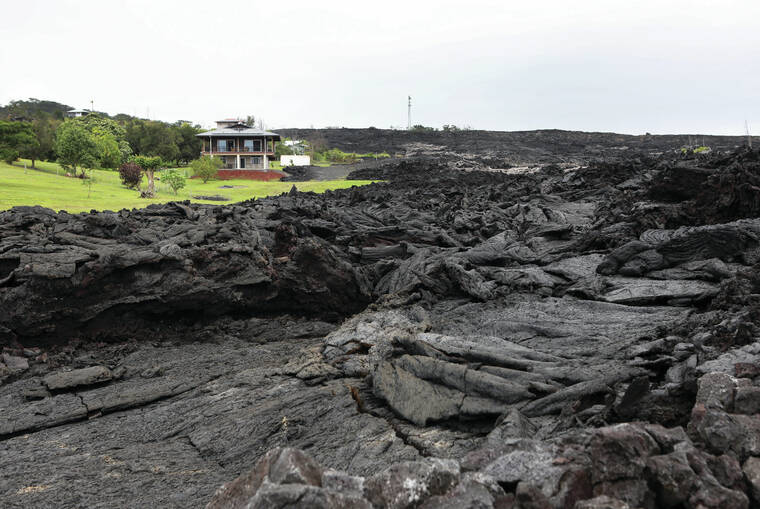Hawaii County will begin buying land from homeowners whose houses were isolated, damaged or destroyed by the 2018 Kilauea eruption as soon as late April.
To date, the county’s Voluntary Housing Buyout Program — which allows property owners to have their eruption-damaged properties bought out by the county for up to $230,000 — has received 467 applications over the course of two phases.
The first phase, which began April 30, 2021, allowed owners of primary residences impacted by the eruption to apply for a buyout. County recovery officer Douglas Le said there are 289 active applications for primary homeowners so far.
The remaining 178 active applications are from the second phase, which ran from Nov. 1, 2021, to the end of January, and allowed owners of secondary residences to apply.
Le said the county has begun making offers to primary residence applicants, many of which have been accepted. However, because of the process of drawing federal money — the U.S. Department of Housing and Urban Development is funding the project with $107 million in Community Development Block Grant funds — there is still a bit more time before money and land will change hands.
“We’re starting to line up the escrow process, which typically takes 30 to 45 days anyway,” Le said. “We’re trying to line up the escrow appointments so we can do that while we run out the wait time on the federal money.”
Le estimated that the first transactions could happen late April and early May.
Former Kapoho Vacationland resident Larry Oberman said he received an offer on Monday from the county to buy out his inundated property for $211,000.
“I think I could have gotten the full $230,000 if I had complained,” Oberman said. “But it’s not a big deal.”
Oberman said he intends to take the offer. Although he was hesitant at first, partly wanting to keep the property for nostalgia’s sake, he said he wants to move on.
“The thing about Kapoho is that it was a wasteland — it was nothing but lava before,” Oberman said. “Everything that was there, we built. But we’re too old to be pioneers again.”
Oberman said he has been frustrated by the slow pace of the buyout program, and that the offer on Monday was the only communication he has received from the county about his application since October.
Le acknowledged that the buyouts have been a long time coming, but added that the county wants to do due diligence on every offer to ensure that both the county and the property owners face as little risk possible during the transactions.
Next week, the county will begin scheduling appointments with owners of secondary residences, Le said.
However, substantial changes may be coming to the program’s third phase, which would allow owners of undeveloped land to apply for buyouts.
Le said a proposed amendment to the program will be released Monday, initiating a 30-day public comment period. That amendment would significantly reduce the maximum payout possible for undeveloped land, from $230,000 to $22,000.
“Looking back, we probably should have set undeveloped and developed lots as separate categories,” Le said, saying that the median value of undeveloped lots in the area is about $21,900.
The reason for the reduction, Le said, is the scale of the program so far. If the 467 applications so far are paid out, he said, it will commit nearly $90 million of the program’s $107 million in available funds.
“Our objective from the beginning was to serve as many people as possible,” Le said.
Because of that change, the amendment also would delay the beginning of Phase 3 from the beginning of May to mid-July.
Meanwhile, another program launched concurrently with the buyout program will end. It was to provide $1.6 million for housing relocation assistance for low- to moderate-income households displaced by the eruption.
Le said the program has been unsuccessful and will be eliminated, and its funding will be folded back into the buyout program.
Since it began, the housing relocation program received only 38 applications, Le said. Some were ineligible simply for not falling into the proper income bracket, but many others were ineligible because they were seeking housing elsewhere in Puna.
“HUD would not allow its money to be spent on housing in Lava Zones 1 and 2,” Le said. “We were offering help with things like security deposits, and we checked with HUD to see if those still counted, and they said it did.”
Le said his team could not find a way to keep the program viable and, at an impasse, decided to end it and provide housing assistance through other county programs.
The public comment period for the amended buyout program will begin Monday, and the full text of the amendment will be available at recovery.hawaiicounty.gov.
An online public meeting about the amendment is scheduled for April 18.
Email Michael Brestovansky at mbrestovansky@hawaiitribune-herald.com.






